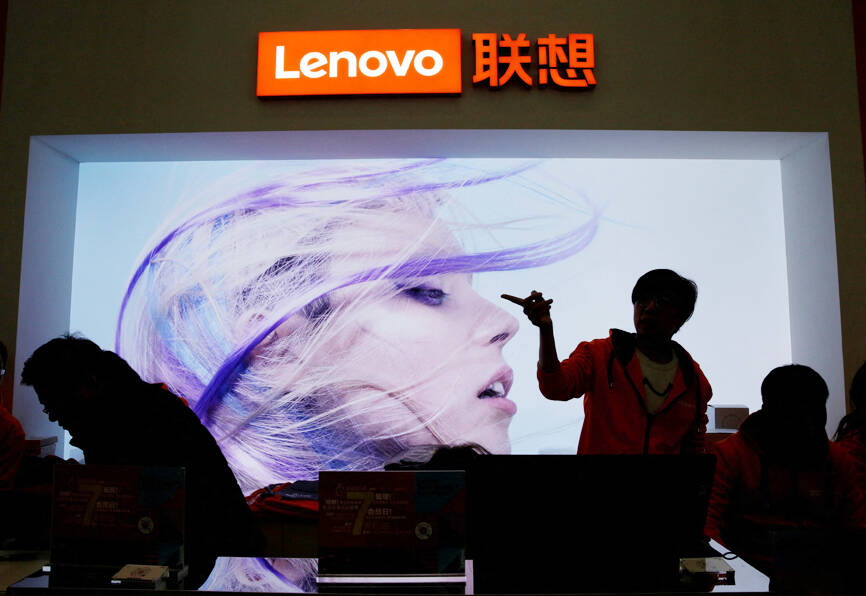Lenovo Group Ltd (聯想) started building artificial intelligence (AI) servers in India’s south, the latest boon for the rapidly growing country’s push to become a high-tech powerhouse.
The company yesterday said it has started making the large, powerful computers in Pondicherry, southeastern India, moving beyond products such as laptops and smartphones.
The Chinese company would also build out its facilities in the Bangalore region, including a research lab with a focus on AI.

Photo: Reuters
Lenovo’s plans mark another win for Indian Prime Minister Narendra Modi, who tries to attract more technology investment into the country. While India’s tense relationship with China has suffered setbacks in the past few years, global tech companies see it as an attractive option to build out operations as Beijing and Washington are mired in a trade war.
The servers perform the computations needed to run services including generative AI, made famous by apps such as ChatGPT. The addition of AI servers means Lenovo would make its entire stack of hardware in India for the domestic as well as export markets, underscoring the country’s importance for the company.
While India’s tech manufacturing sector is still small compared with China, it has been catching up and now makes increasingly sophisticated products such as iPhones. AI servers represent another milestone, showing that India can offer an alternative to regions with more established high-end manufacturing industries.
Taiwan currently produces the bulk of the world’s AI servers, which are used by technology giants such as Amazon.com Inc, Microsoft Corp and Nvidia Corp.
However, with geopolitical tensions on the rise between China and the West, companies are under pressure to shift manufacturing outside Taiwan.
Demand for generative AI tools and applications has sent the need for related hardware soaring, with electronics manufacturer Foxconn Technology Group (富士康科技集團) last year predicting that annual sales of AI servers could reach US$150 billion by 2027.

In Italy’s storied gold-making hubs, jewelers are reworking their designs to trim gold content as they race to blunt the effect of record prices and appeal to shoppers watching their budgets. Gold prices hit a record high on Thursday, surging near US$5,600 an ounce, more than double a year ago as geopolitical concerns and jitters over trade pushed investors toward the safe-haven asset. The rally is putting undue pressure on small artisans as they face mounting demands from customers, including international brands, to produce cheaper items, from signature pieces to wedding rings, according to interviews with four independent jewelers in Italy’s main

Japanese Prime Minister Sanae Takaichi has talked up the benefits of a weaker yen in a campaign speech, adopting a tone at odds with her finance ministry, which has refused to rule out any options to counter excessive foreign exchange volatility. Takaichi later softened her stance, saying she did not have a preference for the yen’s direction. “People say the weak yen is bad right now, but for export industries, it’s a major opportunity,” Takaichi said on Saturday at a rally for Liberal Democratic Party candidate Daishiro Yamagiwa in Kanagawa Prefecture ahead of a snap election on Sunday. “Whether it’s selling food or

CONCERNS: Tech companies investing in AI businesses that purchase their products have raised questions among investors that they are artificially propping up demand Nvidia Corp chief executive officer Jensen Huang (黃仁勳) on Saturday said that the company would be participating in OpenAI’s latest funding round, describing it as potentially “the largest investment we’ve ever made.” “We will invest a great deal of money,” Huang told reporters while visiting Taipei. “I believe in OpenAI. The work that they do is incredible. They’re one of the most consequential companies of our time.” Huang did not say exactly how much Nvidia might contribute, but described the investment as “huge.” “Let Sam announce how much he’s going to raise — it’s for him to decide,” Huang said, referring to OpenAI

Nvidia Corp’s negotiations to invest as much as US$100 billion in OpenAI have broken down, the Wall Street Journal (WSJ) reported, exposing a potential rift between two of the most powerful companies in the artificial intelligence (AI) industry. The discussions stalled after some inside Nvidia expressed concerns about the transaction, the WSJ reported, citing unidentified people familiar with the deliberations. OpenAI makes the popular chatbot ChatGPT, while Nvidia dominates the market for AI processors that help develop such software. The companies announced the agreement in September last year, saying at the time that they had signed a letter of intent for a strategic